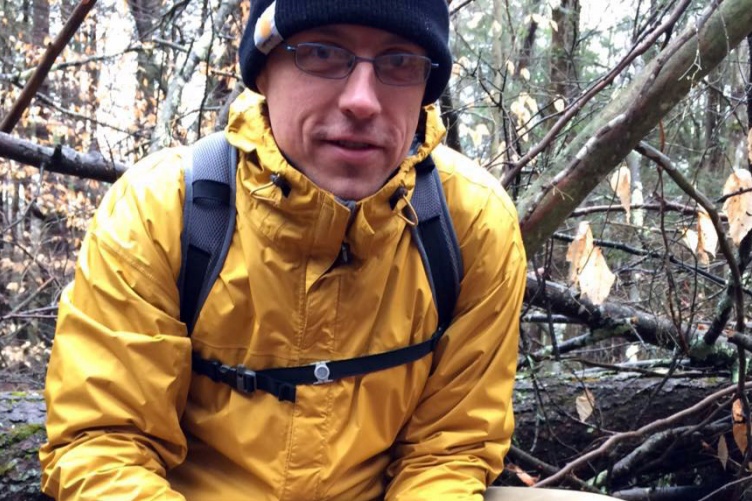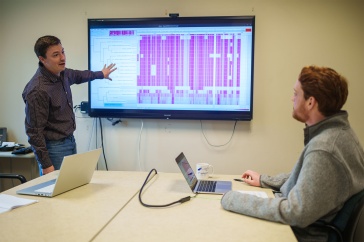
Rory Carroll, who will graduate in May 2019 with a PhD in wildlife and conservation biology, has conducted extensive research about the state’s bobcat population with New Hampshire Agricultural Experiment Station scientist Dr. Marian Litvaitis. Learn about why he chose UNH for his graduate studies, what he researched, and what he's gained from his research experience.
Why did you decide to get your graduate degree from UNH?
I was excited to come to UNH for several reasons. The university has a national reputation for prolific research in natural resources disciplines. With a lot of prime wildlife habitat, New Hampshire is a great setting for the type of research I wanted to do. When I visited the school, the people I met seemed very open, welcoming, and passionate about their work. I couldn’t wait to get here and contribute to the community!
What is the focus of your research interests and why?
 Bobcats have made a spectacular recovery in the last several decades in New Hampshire. They were on the brink of being completely eliminated from the state yet today they are thriving. Meanwhile the human population has also grown, and more and more landscapes are being developed to support us. This begs the question, are bobcats thriving in spite of humans or perhaps because of them? My research focuses on assessing the ways humans are impacting bobcats, directly and indirectly, for better or worse, and what those impacts mean for wildlife conservation. I hope to use my study of bobcats to develop a more complete understanding of human-wildlife relationships and how we can best coexist.
Bobcats have made a spectacular recovery in the last several decades in New Hampshire. They were on the brink of being completely eliminated from the state yet today they are thriving. Meanwhile the human population has also grown, and more and more landscapes are being developed to support us. This begs the question, are bobcats thriving in spite of humans or perhaps because of them? My research focuses on assessing the ways humans are impacting bobcats, directly and indirectly, for better or worse, and what those impacts mean for wildlife conservation. I hope to use my study of bobcats to develop a more complete understanding of human-wildlife relationships and how we can best coexist.
What has it been like having experiment station researcher Dr. Marian Litvaitis as your mentor?
Dr. Litvaitis has been a great advisor. She has helped me develop the tools I need to succeed as a scientist and become a well-rounded academic. She has provided powerful support and direction, guided me down fruitful paths in my research, and opened doors through networking opportunities. Her openness and honesty about her own experiences in academia have given me a unique perspective into life as a scientist. She also encouraged me to explore my own interests in the lab and allowed me the freedom to spend a lot of time in the community as a science educator. Thanks to Dr. Litvaitis’ mentorship, I feel I am very well prepared to be a productive researcher and colleague and will be successful no matter what my post-graduate career holds.
What would you tell prospective graduate students about your research experience? What do you feel you gained most from it?
Throughout the process of your graduate study, you will be digging really deep into a narrow field. Things can (and will) get complicated with your research. It is extremely important you don’t lose sight of the big picture, both in your academic life and personal life. Always remember why you are doing the work you are doing and why it is important to scientists outside your discipline and to nonscientists as well. Find ways to work in your community and share your research with many different people. This is what will ultimately give your research the most meaning. Also remember there’s much more to life than work; take time to enjoy the people and hobbies you love outside academia. Lastly, strive to connect with your fellow grad students personally and professionally. Learn from one another. They may just become your closest collaborators and friends.
What are your plans after graduation?
After graduation, I hope to focus on teaching through wildlife research. As one researcher I can only do so much, but I can have an enormous impact by inspiring a cadre of students to become knowledgeable and responsible stewards of the land and its creatures. I want to engage learners in meaningful research and prepare them for productive careers as scientists and informed citizens by exploring ecology and the scientific method. I want to help create a generation of people who appropriately value the natural world and respect their place in it.
Related Content
Video: Human impacts on the diet of a charismatic predator, the bobcat (Lynx rufus)
UNH Scientists Using DNA Analysis to Assess Abundance of NH’s Bobcats
Are New Hampshire’s Bobcats Well-Connected?
Bobcat in the Backyard: NH Wildcat Responding to Detrimental Effects of Roads
New UNH Bobcat Research Aims to Understand Why Wildcats Are Rebounding
This research is supported by the NH Agricultural Experiment Station, through joint funding of the National Institute of Food and Agriculture, U.S. Department of Agriculture, under award number 1009906, and the state of New Hampshire. It is also supported by an NSF Graduate Research Fellowship to Rory Carroll. This research also is supported by New Hampshire Fish & Game.
Founded in 1887, the NH Agricultural Experiment Station at the UNH College of Life Sciences and Agriculture is UNH’s original research center and an elemental component of New Hampshire's land-grant university heritage and mission. We steward federal and state funding, including support from the USDA National Institute of Food and Agriculture, to provide unbiased and objective research concerning diverse aspects of sustainable agriculture and foods, aquaculture, forest management, and related wildlife, natural resources and rural community topics. We maintain the Woodman and Kingman agronomy and horticultural research farms, the Macfarlane Research Greenhouses, the Fairchild Dairy Teaching and Research Center, and the Organic Dairy Research Farm. Additional properties also provide forage, forests and woodlands in direct support to research, teaching, and outreach.
-
Written By:
Lori Tyler Gula, PhD | NH Agricultural Experiment Station | lori.gula@unh.edu | 603-862-1452

















































